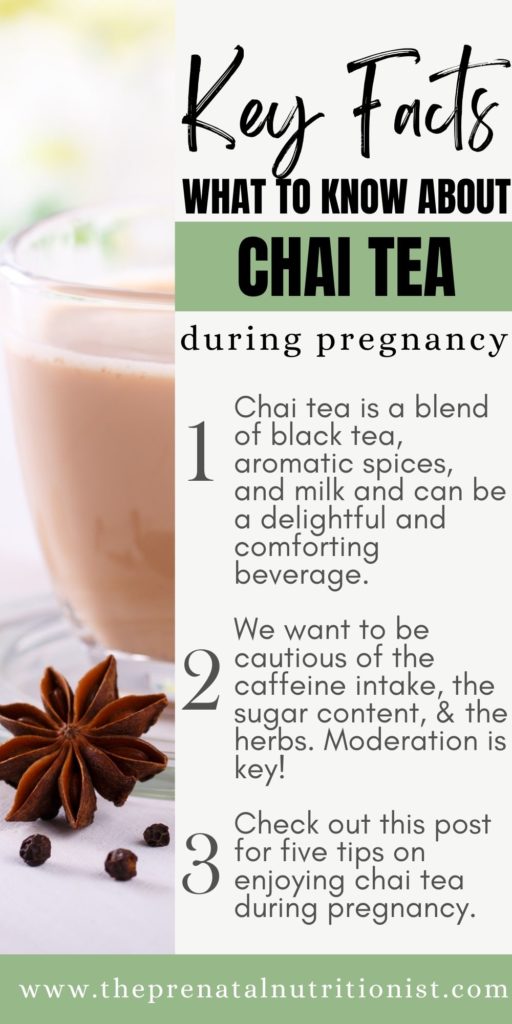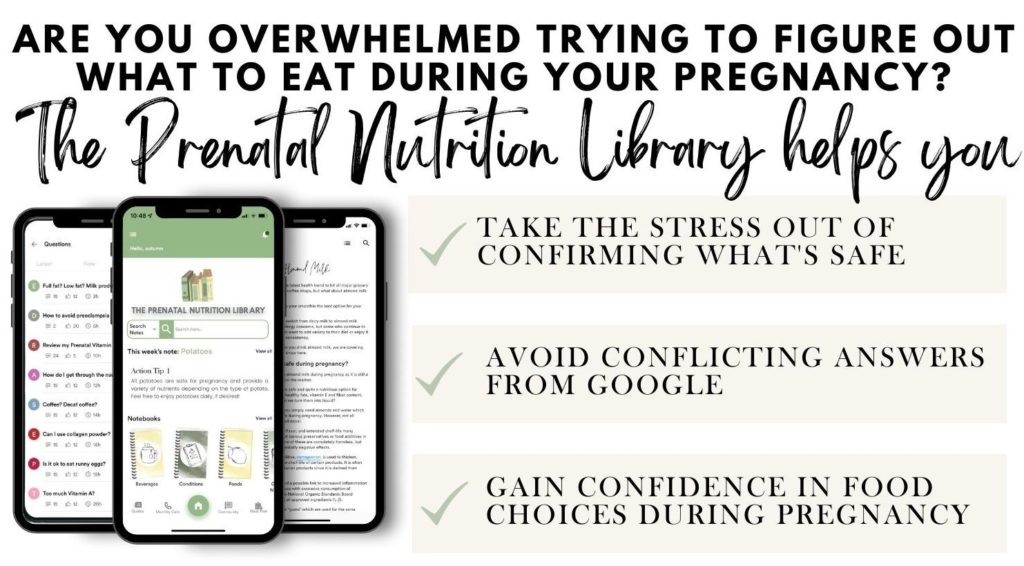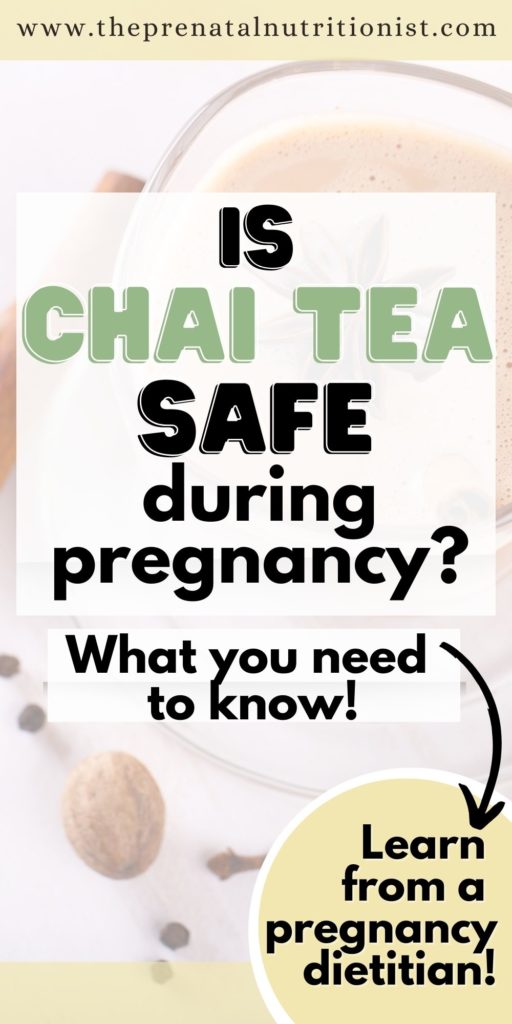
Pregnancy is a time of both excitement and a multitude of questions. A balanced and healthy lifestyle is essential for both you as an expecting mother and your growing baby. One common question that often arises during this journey is regarding caffeine consumption. Caffeine is a stimulant found in various beverages. Excessive caffeine consumption has the potential to be harmful to the developing fetus.
Caffeine can cross the placenta, reaching the developing baby. The potential effects of high amounts of caffeine are reduced birth weight, miscarriage, small for gestational age, stillbirth, and more. As a result, healthcare professionals generally recommend limiting caffeine intake during pregnancy. You can learn more about the research on caffeine during pregnancy inside The Prenatal Nutrition Library so you can confidently sip on your favorite beverages!
Caffeine is found in various beverages, including coffee, tea, energy drinks, and soda. The caffeine content will vary, so it’s important to be mindful of your overall caffeine intake from all sources during pregnancy.
With that in mind, I’ll address the question: Is chai tea safe during pregnancy? I will also explore the caffeine content in chai tea and tips for enjoying it during pregnancy.
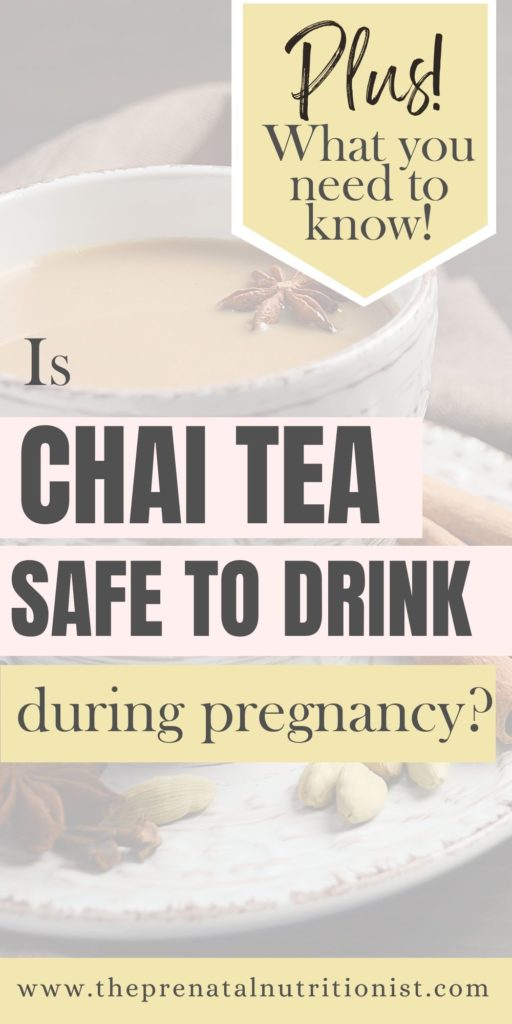
Is Chai Tea Safe During Pregnancy?
When it comes to the safety of enjoying chai tea during pregnancy, the answer is generally yes! Chai tea, with its blend of black tea, aromatic spices, and milk, can be a delightful and comforting beverage for expectant mothers. However, there are a few important considerations to remember to ensure a healthy chai tea experience throughout your pregnancy journey.
Two of the primary considerations regarding drinking chai tea during pregnancy are its added sugar and caffeine content. While chai tea does contain black tea, which naturally contains caffeine, the caffeine levels can vary depending on factors such as the type of tea used and the brewing method. On average, an 8-ounce cup of chai tea contains around 50 milligrams of caffeine, ranging from 25 mg to 60 mg. Either end of the spectrum is significantly less than a cup of coffee. This makes chai tea a lower-caffeine alternative to coffee for those looking to reduce their caffeine intake during pregnancy!
It’s important to note that caffeine consumption during pregnancy should be limited. The American College of Obstetricians and Gynecologists (ACOG) suggests that pregnant women should limit their caffeine intake to no more than 200 milligrams per day. This recommendation applies to all sources of caffeine, including chai tea and things like chocolate. However, circumstances may vary, and it’s always best to consult your healthcare provider to determine the appropriate caffeine intake for your specific situation. Individuals considered “high risk” during pregnancy may benefit from eliminating caffeine altogether.
One thing is clear: less caffeine is better. However, moderate caffeine intake during pregnancy is considered okay for most people during pregnancy, and eliminating it completely is not usually necessary. Having an open conversation with your healthcare provider is crucial to understanding the guidelines and recommendations for your pregnancy! Caffeine is just one piece of the conversation. As mentioned above, added sugar in chai tea is also something to look out for! Let’s discuss this and other tips below.
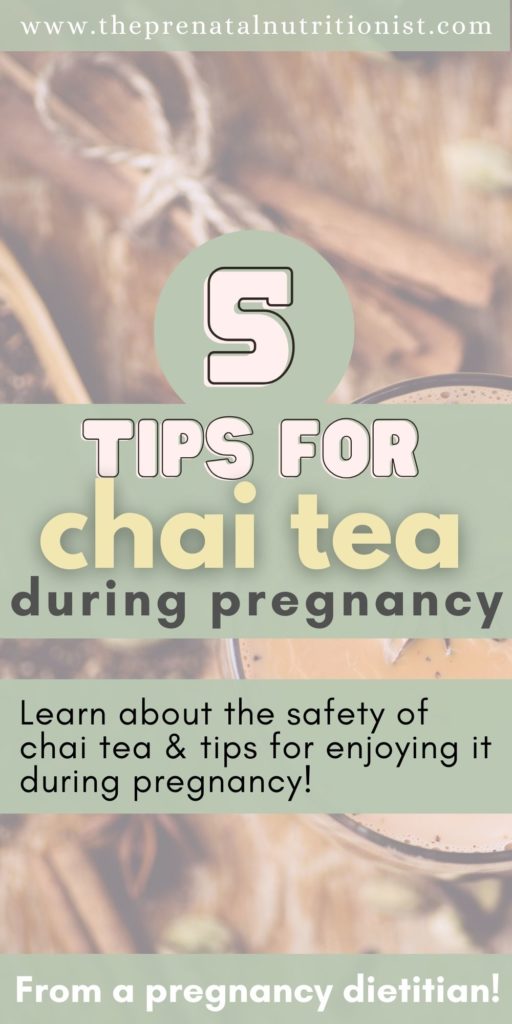
Tips For Drinking Chai Tea During Pregnancy
While you can safely enjoy Chai tea while pregnant, there are some considerations to put on your radar:
1. Consider the caffeine in Chai Tea.
As mentioned above, keep total caffeine intake in mind. To minimize caffeine intake, you can also consider decaffeinated chai tea options. While regular chai tea naturally contains caffeine, decaf options offer another alternative for pregnant women. Whether you choose decaf or not, the caffeine content of chai will vary, so be sure to check the packaging or ask your barista about the caffeine content of the specific brand or blend you choose.
2. Check the sugar content.
While the spices in chai tea provide a delightful flavor, many pre-packaged chai tea mixes or chai lattes contain added sugars. In fact, a grande chai tea latte at Starbucks has about 42 grams of sugar. The good news? At most coffee shops, Starbucks included, it’s an option to modify the amount of sweeteners and syrups added. You could also opt for homemade or unsweetened chai tea to reduce added sugar intake. If you like your chai tea sweet, that is totally okay. You can absolutely fit this into your day while being mindful of where else you are getting added sugar from.
3. Explore safe herbal tea alternatives.
If you prefer to avoid caffeine altogether, consider exploring herbal chai tea blends. These delightful concoctions typically consist of herbal infusions and spices sans black tea. Popular herbal chai tea variations include masala chai, made with ingredients like cinnamon, ginger, cardamom, and star anise. Always ensure that the herbal teas you choose are safe for consumption during pregnancy, as some herbs are recommended to avoid. For example, licorice root is on the “avoid list.”
4. Moderation is key.
As with any food or beverage choice during pregnancy, moderation is key. While chai tea is considered safe, monitoring your caffeine intake is important. Remember that the caffeine content in chai tea can vary depending on the brand, brewing method, and the tea used. To be safe, it’s best to enjoy chai tea in moderation and consume plenty of other hydrating choices in your day, like water!
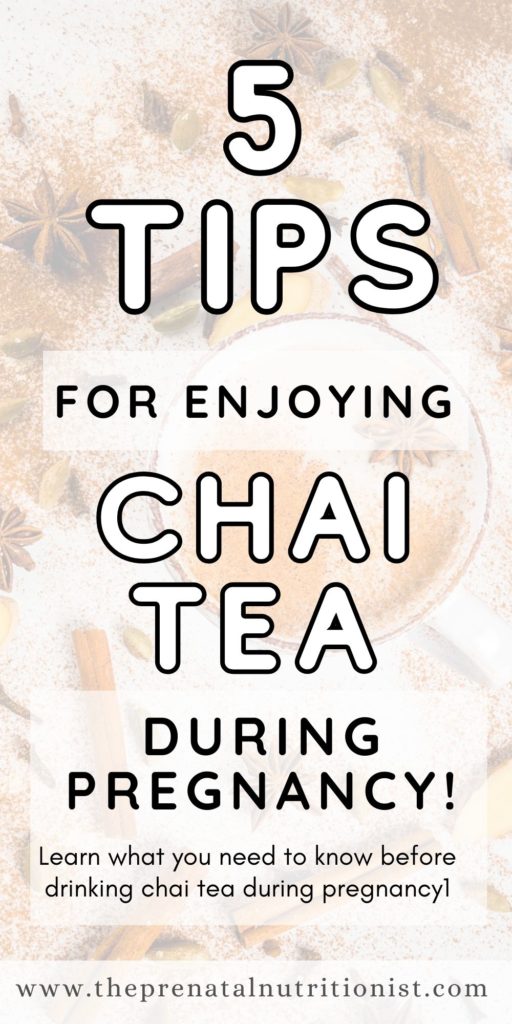
5. Timing.
Drinking Chai tea earlier in the day may be advisable to minimize any potential impact of caffeine on sleep. Some people are very caffeine-sensitive, and having any caffeine later in the day disturbs their sleep. Know your personal caffeine cut-off time for the best rest.
Understanding these considerations helps you enjoy Chai tea’s delightful flavor and ensures that you and the baby get the best nutrition. Your well-being and your baby’s well-being are of utmost importance, which is why you are reading this blog, of course! The good news is that the “avoid list” is not nearly as long as we’re often told. There are many healthy beverages for pregnancy. When it comes to Chai tea, it’s safe to enjoy it in moderation!
Search The Prenatal Nutrition Library App for more information on caffeine, tea, herbal tea, and other pregnancy-safe beverages. With The Prenatal Nutrition Library app, you always have a trusted answer from the experts at your fingertips!
Chai tea is safe to enjoy during pregnancy in moderation. Be mindful of overall caffeine intake!
Chai tea can be enjoyed during pregnancy, but it’s essential to consider your overall caffeine intake. This is especially true if you consume caffeine from various sources throughout the day.
Decaffeinated and caffeine-free herbal Chai tea are options, but you can safely indulge in Chai tea in moderation if it’s something you want to enjoy. Consult your healthcare provider or dietitian for personalized advice on caffeine consumption and healthy beverages during pregnancy. Your health and your baby’s health is the top priority here. Making informed choices that are best for YOU is critical to a safe and healthy pregnancy.
Maintaining a well-balanced diet, minimizing caffeine intake, and incorporating plenty of hydrating fluids are just a few aspects of a healthy pregnancy. Listen to your body, nourish it with nutritious foods, and enjoy this special time in your life. And along the way, make my blog your regular go-to guide for all things food and nutrition for pregnancy. Here are some of the many beverage-related topics I’ve covered on the blog;
- Can You Drink Energy Drinks While Pregnant?
- Does Jasmine Tea Contain Caffeine?
- Does Chai Tea Have Caffeine?
For more in-depth information on nutrition during preconception + pregnancy and expert-crafted meal plans, be sure to check out The Prenatal Nutrition Library (TPNL). The Prenatal Nutrition Library is your one-stop shop for evidence-based answers to all your pregnancy nutrition questions so you know what you eat is safe and provides optimal nutrients for pregnancy. Want to try a sample meal plan first? Download my FREE 1-week meal plan for pregnancy!
